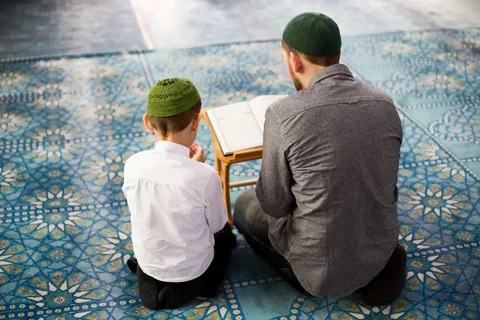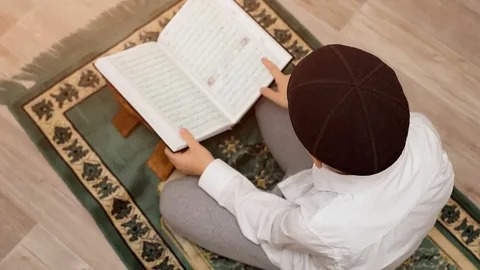In today’s fast-paced world, it’s crucial to instill strong values and faith in our children from an early age. For Muslim families, teaching Islamic studies to kids is an essential part of their upbringing. These studies not only help in fostering a strong sense of faith but also provide a deeper understanding of Islamic traditions, values, and history. In this article on Arabian Tongue website, we will explore the top Islamic studies for kids that make learning about Islam engaging, informative, and enjoyable.
Why Islamic Studies for Kids Matter

Before delving into the best resources available, let’s understand why Islamic studies for kids are so significant.
Building a Strong Foundation of Faith
Islamic studies at an early age lay the groundwork for a strong faith foundation. Kids learn about the basics of Islam, including the Five Pillars, beliefs, and practices, helping them connect with their religion on a profound level.
Promoting Moral Values
These studies emphasize the importance of ethical behavior, kindness, and compassion. Children learn about the importance of honesty, integrity, and respecting others, which are fundamental principles of Islam.
Fostering Cultural Understanding
Islamic studies provide insights into the rich cultural and historical aspects of the Muslim world. Kids develop an appreciation for diversity and different cultures, promoting tolerance and understanding.
The Top Resources for Islamic Studies
Now, let’s explore some of the best resources available to teach Islamic studies to kids effectively.
Islamic Children’s Books
Islamic children’s books come in a variety of engaging formats, from picture books to chapter books. These books often feature relatable characters and stories that help kids connect with Islamic values.
Interactive Apps and Websites
In today’s digital age, interactive apps and websites offer a dynamic way to teach Islamic studies. These platforms provide games, quizzes, and interactive lessons, making learning fun and educational.
Islamic Board Games
Board games like “Islamic Jeopardy” and “Muslim Family Trivia” turn learning into a family-friendly activity. These games encourage healthy competition while imparting knowledge about Islam.
Islamic Schools and Sunday Schools
Many communities offer Islamic schools or Sunday schools where kids can receive formal Islamic education. These institutions provide a structured curriculum and a supportive environment.
YouTube Channels and Educational Videos
Several YouTube channels and websites offer educational videos on various aspects of Islam. These videos often include animated stories and lessons, making them engaging for kids.
Teaching Methods for Effective Learning

To ensure that kids benefit fully from Islamic studies, it’s essential to use effective teaching methods.
- Age-Appropriate Content: Tailor the content to the child’s age and comprehension level. Younger children may enjoy stories and simple lessons, while older kids can delve into more complex topics.
- Consistency and Repetition: Consistent exposure to Islamic studies course for kids reinforces learning. Daily or weekly lessons help kids remember and internalize the teachings.
- Encourage Questions: Create an open environment where children feel comfortable asking questions about Islam. Encourage curiosity and provide thoughtful answers.
The Pillars of Islam for Kids: A Simple Guide
Before we delve into the details, let’s provide a brief overview of what the Pillars of Islam are. These are the five core acts of worship that form the foundation of a Muslim’s faith and practice. They are as follows:
1. Shahada (Faith)
The first Pillar of Islam is Shahada, which represents the declaration of faith. Muslims believe in the oneness of God (Allah) and the prophethood of Muhammad. It is essential to instill this belief in children from an early age.
2. Salat (Prayer)
Salat, or prayer, is the second Pillar of Islam. Muslims pray five times a day, facing the Kaaba in Mecca. Teaching kids the importance of regular prayer and its connection to spirituality is crucial.
3. Zakat (Charity)
The third Pillar is Zakat, which emphasizes the importance of charity and helping those in need. Children can learn the value of giving and sharing with others through age-appropriate activities.
4. Sawm (Fasting)
During the holy month of Ramadan, Muslims observe Sawm, or fasting, from sunrise to sunset. Explaining the significance of self-discipline and empathy for the less fortunate can be a valuable lesson for kids.
5. Hajj (Pilgrimage)
The fifth Pillar of Islam is Hajj, the pilgrimage to Mecca that Muslims undertake at least once in their lifetime if they are physically and financially able. While kids may not be ready for this journey, teaching them about its importance can be enlightening.
What is the Right Age to Teach Children about Islam and Reading Quran?
Islamic scholars and educators emphasize the importance of early religious education. The Prophet Muhammad (peace be upon him) himself encouraged teaching children about Islam from a young age. Early exposure to Islamic principles and values can help shape a child’s character and provide a strong moral foundation.
Age-Appropriate Methods
When deciding the right age to begin teaching children about Islam, it’s crucial to consider age-appropriate methods. Young children may not grasp complex theological concepts, so it’s essential to use simple language and engaging activities to convey fundamental principles.
When to Start Quranic Reading
The timing of when to start Quranic reading can vary from child to child. Some may begin as early as age five or six, while others may start later. It’s essential to assess a child’s readiness and interest.
FAQs
What age is suitable to start Islamic studies for kids?
Islamic studies can begin as early as preschool age, with age-appropriate materials and lessons.
How can I make Islamic studies more engaging for my child?
Incorporate interactive resources like apps, games, and videos to make learning fun.
Are there Islamic studies programs available online?
Yes, many online platforms offer Islamic studies programs for kids, allowing flexibility in learning.
What topics are typically covered in Islamic studies for children?
Topics may include the Five Pillars of Islam, Prophet stories, basic Arabic, and Islamic ethics.
How can I find a local Islamic school or Sunday school for my child?
You can inquire at your local mosque or search online for Islamic educational institutions in your area.
Conclusion
Incorporating Islamic studies into a child’s education is an invaluable investment in their faith, character, and cultural awareness. By utilizing the diverse range of resources available, parents and educators can make the learning journey enjoyable and enriching.


